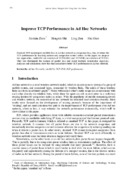Mostrar el registro sencillo del ítem
Mejorar el rendimiento de TCP en redes Ad Hoc
| dc.contributor.author | Zhou, Jianxin | spa |
| dc.contributor.author | Shi, Bingxin | spa |
| dc.contributor.author | Zou, Ling | spa |
| dc.contributor.author | Shen, Hui | spa |
| dc.date.accessioned | 2020-10-27T00:21:25Z | |
| dc.date.available | 2020-10-27T00:21:25Z | |
| dc.date.issued | 2003-06-01 | |
| dc.identifier.issn | 2539-2115 | |
| dc.identifier.issn | 1657-2831 | |
| dc.identifier.uri | http://hdl.handle.net/20.500.12749/9054 | |
| dc.description.abstract | El TCP estándar malinterpreta la pérdida de movilidad en la red ad hoc como pérdida de congestión, por lo que reduce el rendimiento de TCP al invocar una acción de control de congestión innecesaria. En este documento, proponemos dos enfoques, simELFN (una variación de TCP-ELFN) y TCP-FSR (una variación de TCP-F). Pueden distinguir la esencia de la pérdida de paquetes y evitar múltiples duplicados consecutivos. Los análisis y simulaciones muestran que pueden lograr un mejor rendimiento de TCP en la red Ad hoc. | spa |
| dc.format.mimetype | application/pdf | spa |
| dc.language.iso | spa | spa |
| dc.publisher | Universidad Autónoma de Bucaramanga UNAB | |
| dc.relation | https://revistas.unab.edu.co/index.php/rcc/article/view/1097/1069 | |
| dc.relation.uri | https://revistas.unab.edu.co/index.php/rcc/article/view/1097 | |
| dc.rights | Derechos de autor 2003 Revista Colombiana de Computación | |
| dc.rights.uri | http://creativecommons.org/licenses/by-nc-sa/4.0/ | * |
| dc.rights.uri | http://creativecommons.org/licenses/by-nc-nd/2.5/co/ | |
| dc.source | Revista Colombiana de Computación; Vol. 4 Núm. 1 (2003): Revista Colombiana de Computación; 74-87 | |
| dc.subject | Innovaciones tecnológicas | |
| dc.subject | Ciencia de los computadores | |
| dc.subject | Desarrollo de tecnología | |
| dc.subject | Ingeniería de sistemas | |
| dc.subject | Investigaciones | |
| dc.subject | Tecnologías de la información y las comunicaciones | |
| dc.subject | TIC´s | |
| dc.title | Mejorar el rendimiento de TCP en redes Ad Hoc | spa |
| dc.title.translated | Improve TCP performance in Ad Hoc netwoks | eng |
| dc.type.driver | info:eu-repo/semantics/article | |
| dc.type.local | Artículo | spa |
| dc.type.coar | http://purl.org/coar/resource_type/c_7a1f | |
| dc.subject.keywords | Technological innovations | eng |
| dc.subject.keywords | Computer science | eng |
| dc.subject.keywords | Technology development | eng |
| dc.subject.keywords | Systems engineering | eng |
| dc.subject.keywords | Investigations | eng |
| dc.subject.keywords | Information and communication technologies | eng |
| dc.subject.keywords | ICT's | eng |
| dc.subject.keywords | Ad hoc networks | eng |
| dc.subject.keywords | simELFN | eng |
| dc.subject.keywords | TCP-FSR | eng |
| dc.subject.keywords | TCP performance | eng |
| dc.identifier.instname | instname:Universidad Autónoma de Bucaramanga UNAB | spa |
| dc.type.hasversion | Info:eu-repo/semantics/publishedVersion | |
| dc.type.hasversion | info:eu-repo/semantics/acceptedVersion | |
| dc.rights.accessrights | info:eu-repo/semantics/openAccess | spa |
| dc.relation.references | http://www.ietf.org/html.charters/manet-charter.html | |
| dc.relation.references | H. Balakrishnan, V. Padmanabhan, S. Seshan, and R. Katz, A comparison of mechanisms for improving TCP performance over wireless links, in ACM SIGCOMM, Stanford, CA, Aug. 1996 | |
| dc.relation.references | K. Chandran, S. Raghunathan, S. Venkatesan and R. Prakash, "A feedback based scheme for improving TCP performance in ad-hoc wireless networks", International Conf. Distributed Computing Systems, May 1998. | |
| dc.relation.references | G. Holland and N. Vaidya, "Analysis of TCP performance over mobile ad hoc networks", Mobicomm'99, Aug. 1999. | |
| dc.relation.references | M. Allman, V. Paxson, W. Stevens. TCP Congestion Control. RFC2581. Apr. 1999. | |
| dc.relation.references | D. Johnson, D.A. Maltz, J. Broch, The Dynamic Source Routing Protocol for Mobile Ad Hoc Networks (draft-ietf-manet-dsr-06.txt), Mobile Ad-hoc Network(MANET) Working Group, IETF, Nov 2001. | |
| dc.relation.references | J.P. Monks, P. Sinha, and V. Bharghavan, "Enhancements and Limitations of TCP-ELFN for Ad Hoc Networks", Proceedings of The 7th International Workshop on Mobile Multimedia Communications (MoMuC 2000) , Oct., 2000. | |
| dc.relation.references | K. Fall, K. Varadhan, ns Notes and Documents, VINT project, http://www.isi.edu/nsnam/ns/ Feb. 2000. | |
| dc.relation.references | F. Wang and Y. G. Zhang, Improving TCP performance over Mobile Ad-Hoc Networks with Detection of Out-of-Order and Response (DOOR), Proceedings of Mobihoc 02, June. 2002. | |
| dc.contributor.googlescholar | Shen, Hui [L_nr4IIAAAAJ] | spa |
| dc.subject.lemb | Ciencias de la computación | spa |
| dc.subject.lemb | Ingeniería de sistemas | spa |
| dc.subject.lemb | Investigaciones | spa |
| dc.subject.lemb | Tecnologías de la información y la comunicación | spa |
| dc.identifier.repourl | repourl:https://repository.unab.edu.co | |
| dc.description.abstractenglish | Standard TCP misinterpret mobility loss in Ad hoc network as congestion loss, thus, it reduce the TCP performance by invoking unnecessary congestion control action. In this paper, we propose two approaches, simELFN (an variation of TCP-ELFN) and TCP-FSR (an variation of TCP-F). They can distinguish the essence of packet loss and avoid multiple consecutive dupACKs. Analyses and simulations show that they can achieve better TCP performance in Ad hoc network. | eng |
| dc.subject.proposal | Redes ad hoc | spa |
| dc.subject.proposal | Rendimiento TCP | spa |
| dc.subject.proposal | Desarrollo tecnológico | spa |
| dc.subject.proposal | Innovaciones tecnológicas | spa |
| dc.type.redcol | http://purl.org/redcol/resource_type/CJournalArticle | |
| dc.rights.creativecommons | Atribución-NoComercial-SinDerivadas 2.5 Colombia | * |


